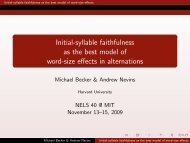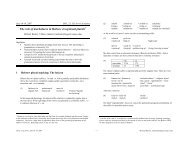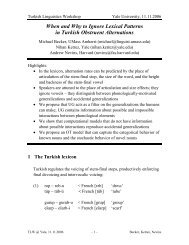- Page 1 and 2: PHONOLOGICAL TRENDS IN THE LEXICON:
- Page 3 and 4: PHONOLOGICAL TRENDS IN THE LEXICON:
- Page 5 and 6: ACKNOWLEDGMENTSWorking on this diss
- Page 7 and 8: For saving my life, I thank Dr. Deb
- Page 9 and 10: of voicing alternations in the lexi
- Page 11 and 12: 2.4.3 The size effect . . . . . . .
- Page 13 and 14: 4.6 Conclusions . . . . . . . . . .
- Page 15 and 16: are several reasons for thinking ab
- Page 17 and 18: etween conflicting grammars, which
- Page 19 and 20: (2)/sprEd + d/ *DD DEP MAXa. ☞ sp
- Page 21 and 22: (4)/gaId + d/ *DD MAX DEPa. ☞ gaI
- Page 23 and 24: At this point, the ranking algorith
- Page 25 and 26: pattern is. Speakers use their gram
- Page 27 and 28: once two segments are merged into o
- Page 29 and 30: Similarly for the Ù -final nouns,
- Page 31 and 32: the singular or only in the plural.
- Page 33 and 34: of the final stop, but they do not
- Page 35 and 36: IDENT(voice) σ1 . The existence of
- Page 37 and 38: Of the 3002 nouns in TELL whose bar
- Page 39 and 40: (22) Height of stem-final vowel n %
- Page 41 and 42: A closer examination of vowel round
- Page 43 and 44: While high has a larger R 2 than si
- Page 45 and 46: ackness of final stem vowels are al
- Page 47: syllable of the CVCVC words were re
- Page 51 and 52: (32) Differences between high and n
- Page 53 and 54: to alternating responses than the b
- Page 55 and 56: contrasted with general-purpose sta
- Page 57 and 58: RCD takes winner-loser pairs such a
- Page 59 and 60: RCD. Pater (2006, 2008b) proposes a
- Page 61 and 62: To replicate the effect that place
- Page 63 and 64: (45)ID(voice) *VtV *VÙV amaÙ *VÙ
- Page 65 and 66: generally don’t alternate, regard
- Page 67 and 68: (51)IDENT IDENT σ1saÙ IDENT σ1ta
- Page 69 and 70: To summarize, the analysis of the s
- Page 71 and 72: with clones of the specific IDENT(v
- Page 73 and 74: vowel, namely *RpV, *RtV, *RÙV, an
- Page 75 and 76: (60) bare stem possessivea. ok ok-u
- Page 77 and 78: Since the deleting dorsals and the
- Page 79 and 80: The MGL works by reading in pairs o
- Page 81 and 82: (66) The difference in rates of alt
- Page 83 and 84: (67) a. The UR’s of [at] and [tat
- Page 85 and 86: Speakers chose voicing alternations
- Page 87 and 88: CHAPTER 3SURFACE-BASED LEXICAL TREN
- Page 89 and 90: -ot with nouns that have [o] in the
- Page 91 and 92: (71) a. Natural gender: Whenever a
- Page 93 and 94: The data in (75) shows that ot-taki
- Page 95 and 96: will stay agnostic about the status
- Page 97 and 98: a-a a-o i-o o-axaSáS (-ót) makór
- Page 99 and 100:
∼ morad-ót ‘slope’, gág ∼
- Page 101 and 102:
(83) Nonce words and the percent of
- Page 103 and 104:
experiment 1 of Berent et al. 1999,
- Page 105 and 106:
The licensing effect emerges when s
- Page 107 and 108:
(86)xalon MASC + {im MASC , ot FEM
- Page 109 and 110:
stress stays on the root 11 , so an
- Page 111 and 112:
(96)Sem MASC + {im MASC , ot FEM }
- Page 113 and 114:
frequency of ot-taking in the lexic
- Page 115 and 116:
(100) LOCAL(o) xalon ≫ φ-MATCH
- Page 117 and 118:
3.4.3 Learning specific patterns fi
- Page 119 and 120:
The problem here is that a single l
- Page 121 and 122:
As the speaker learns the rest of t
- Page 123 and 124:
Under this view, three kinds of Heb
- Page 125 and 126:
that distinguishes local licensing
- Page 127 and 128:
(114) “surface” language “dee
- Page 129 and 130:
garlic, carrots, loquats, zucchinis
- Page 131 and 132:
(118) Here’s one MASC on the righ
- Page 133 and 134:
3.5.4 Transcription and encodingFor
- Page 135 and 136:
in §3.5.5.2, (c) Speakers were bia
- Page 137 and 138:
for the combined stem vowel change
- Page 139 and 140:
the ability to observe any vowel ef
- Page 141 and 142:
(128)memorization score0 5 10 15 20
- Page 143 and 144:
3.5.5.4 Errors and vowel perception
- Page 145 and 146:
3.6.1 The role of Universal Grammar
- Page 147 and 148:
that is indifferent to the vowel of
- Page 149 and 150:
changes could apply in two differen
- Page 151 and 152:
The experimental results cannot be
- Page 153 and 154:
ode) to form the past tense of nove
- Page 155 and 156:
output is not present due to faithf
- Page 157 and 158:
[o] often choose -ot, or one can sa
- Page 159 and 160:
trends in the lexicon and allows th
- Page 161 and 162:
pair from the Support, but leaving
- Page 163 and 164:
simple minimal conflict, which can
- Page 165 and 166:
While this grammar will correctly d
- Page 167 and 168:
(139) or (141), the choice of const
- Page 169 and 170:
(150)C1 C2 C3a. winner1 ≻ loser1
- Page 171 and 172:
that the likelihood of ot-taking in
- Page 173 and 174:
(155)C1 C2 C3 C4a. winner1 ≻ lose
- Page 175 and 176:
introduced, the clone, are discusse
- Page 177 and 178:
*VÙV and ONSET below IDENT(voice)
- Page 179 and 180:
(161)*VÙV 〈taÙ,IDENTσ1 〉 IDE
- Page 181 and 182:
The cloning subroutine in described
- Page 183 and 184:
ability to learn a morphological ca
- Page 185 and 186:
(165)*VÙVIDENT(voice)a. anaÙ-1 PO
- Page 187 and 188:
c. Make ∅ the domain of C W and C
- Page 189 and 190:
three listed possessive forms. Sinc
- Page 191 and 192:
A fully general mechanism for findi
- Page 193 and 194:
cloning. Subjecting the Support in
- Page 195 and 196:
Adding the feature that causes an u
- Page 197 and 198:
one tested. Each hypothesis in turn
- Page 199 and 200:
and the learner’s form are differ
- Page 201 and 202:
irrelevant for the derivation of y1
- Page 203 and 204:
from its distribution, and if two c
- Page 205 and 206:
My approach is in keeping with a ce
- Page 207 and 208:
In the UR-based analysis, the gramm
- Page 209 and 210:
of phonological primitives that con
- Page 211 and 212:
preference for frequent mappings wi
- Page 213 and 214:
that the vowel of the accusative su
- Page 215 and 216:
(195) IDENT(cont) IDENT(voice) IDEN
- Page 217 and 218:
To summarize, the Korean case shows
- Page 219 and 220:
In the approach that attributes hid
- Page 221 and 222:
Both ways of dealing with [sOt] - c
- Page 223 and 224:
following a (non-high) long vowel o
- Page 225 and 226:
(200) Affixation neutralizes a cont
- Page 227 and 228:
d/ → gaIdId), while some verbs re
- Page 229 and 230:
[-Er] only appears when it’s insi
- Page 231 and 232:
It might be worth noting that the d
- Page 233 and 234:
CHAPTER 5CONCLUSIONS AND FUTURE DIR
- Page 235 and 236:
stem or only in the plural stem for
- Page 237 and 238:
5.2.2 The search for underlying rep
- Page 239 and 240:
fact, unbounded at the phrasal leve
- Page 241 and 242:
BIBLIOGRAPHYAharoni, Moti (2007). D
- Page 243 and 244:
Boersma, Paul (2001). Phonology-sem
- Page 245 and 246:
Inkelas, Sharon & Cemil Orhan Orgun
- Page 247 and 248:
Merchant, Nazarré (2008). Discover
- Page 249 and 250:
Tesar, Bruce (1998). Using the mutu





